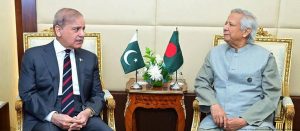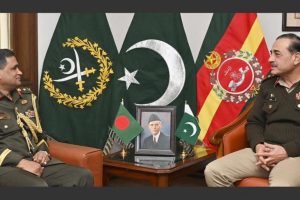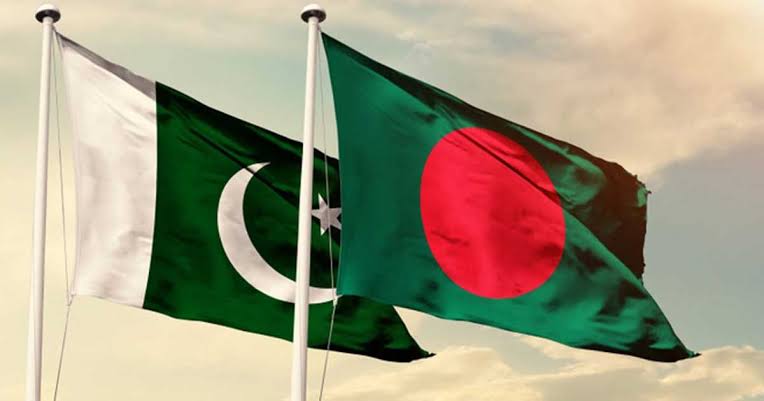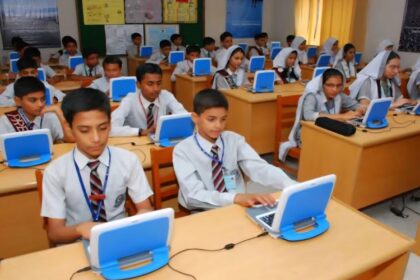Relations between Pakistan and Bangladesh have been dysfunctional since the independence of Bangladesh in 1971. Bangladesh, which was once part of East Pakistan, seceded from Pakistan on December 16, 1971. Pakistan officially recognised Bangladesh in 1974 as a result of a tripartite agreement that took place in New Delhi. The relations have been strained between the two countries since the inception of Bangladesh. The last official visit was made by President Pervez Musharraf in 2002, where he also visited the war memorials of 1971 and said,
“Your brothers and sisters in Pakistan share the same pain of the events of 1971.”
Sheikh Haseena’s pro-India stance and anti-Pakistan views severed the ties between the two countries.
The Role of Sheikh Hasina’s Removal
Following the Monsoon Revolution led by Bangladeshi students, Sheikh Hasina Wajid, who had ruled Bangladesh ruthlessly for over sixteen years, was removed from power and fled to India for her safety. An interim government was formed, with Dr. Muhammad Yunus appointed as the chief adviser. This development has significantly improved the previously strained relations between Pakistan and Bangladesh. Since taking on this role, Dr. Yunus has met with Pakistan’s Prime Minister, Shehbaz Sharif, twice.
Key Meetings and Developments:
During the D-8 summit in Cairo, Shahbaz Sharif and Dr. Yunus met and pledged to strengthen the ties between their two countries, emphasising the importance of mutually beneficial development goals and the significance of fostering people-to-people connections due to their shared cultural and historical bonds. Shahbaz Sharif praised the recent visit of the Bangladesh cricket team to Pakistan and acknowledged a Pakistani artist who performed in Dhaka. In turn, Dr. Yunus encouraged Prime Minister Shahbaz Sharif to address the issues stemming from 1971 to help Dhaka enhance its relationship with Islamabad, to which Sharif replied that the 1974 tripartite agreement had resolved many matters, but he would be willing to review any other outstanding issues.

The two leaders also expressed a desire to expand cooperation in new areas, such as the sugar industry and dengue management, with Prime Minister Shahbaz commending Dr. Yunus for his efforts to revive SAARC and for Bangladesh’s initiative to explore the possibility of holding a summit for the regional organisation.
Military Cooperation and Security Concerns
Lt. Gen. SM Kamr-ul-Hasaan, the principal staff officer of the Armed Forces Division of Bangladesh, paid a visit to the General Headquarters (GHQ) in Rawalpindi. During this visit, he met with Chief of Army Staff (COAS) Syed Asim Munir and Chairman of the Joint Chiefs of Staff Committee (CJCSC) Sahir Shamshad Mirza. In these discussions, they addressed the evolving security dynamics in the region, emphasising the need to enhance military cooperation.

Regional Dynamics and External Influences
The timing of all of these developments is critical because there is so much going on in this region. India is developing cordial relations with the Afghan Taliban for the first time, and Pakistan and Bangladesh are moving closer after years of separation. Pakistan must protect its newly established relations from external influences. India has already stated that it is keeping an eye on developments. Bangladesh, rather than China, could be a potential ally for Pakistan in this region, and Pakistan must take full advantage of the situation. Many experts argue that these relations will be short-lived because Pakistan has yet to issue an official apology to Bangladesh for the events of 1971. This may be the case, but in my humble opinion, Pakistan’s stakeholders do not need to be insecure about an apology, and if asked, they should offer one; nations make mistakes, and what nations should not do is fail to learn from them. Unfortunately, Pakistan has not learnt from its mistakes.
The Way Forward
Pakistan needs to collaborate with their Bengali counterparts in every way. Given the historical and cultural ties that bind the two nations together, cultural exchange programs ought to exist. According to numerous reports, Pakistan Army officers will travel to Bangladesh this month for Bangladesh officers training. The Pakistan Army will be stationed in Bangladeshi cantonments for the first time since 1971.

To promote a closer relationship between the younger generation and eradicate the hostility that their elders on both sides fostered, the Pakistani government should give priority to educational scholarships and fellowships for students. Now is the perfect time for Pakistan to form an economic alliance with Bangladesh, since Sheikh Hasina is currently living in exile in India and the Awami League is no longer in power. There are positive indications that Pakistan and Bangladesh can improve their economic relations. As previously stated, Pakistan and Bangladesh must keep an eye on external influences that may destabilise their relations.
External Threats:

One of the most significant contributors is India’s insecurity since the monsoon revolution. India will make every effort to regain its strategic depth in Bengal. Those in Pakistan’s power corridors must devise an effective strategy to deal with this situation, as well as a policy and strategy to deal with Bangladesh while keeping India, its hostile neighbour, in mind. Amidst all of these developments, one hopes that the relations should be people-centric and that people-to-people contact should be restored.
Writing about these developments made my heart heavy as Pakistan’s legendary poet Faiz Ahmed Faiz Ghazal came to mind: “Dhaka se wapsi par”
ham ki Thahre ajnabī itnī mudārātoñ ke ba.ad
phir baneñge āshnā kitnī mulāqātoñ ke ba.ad
















